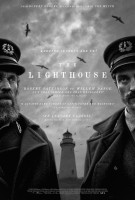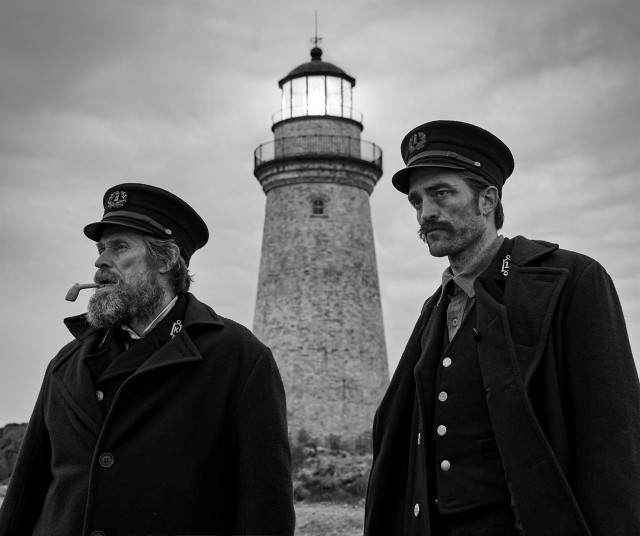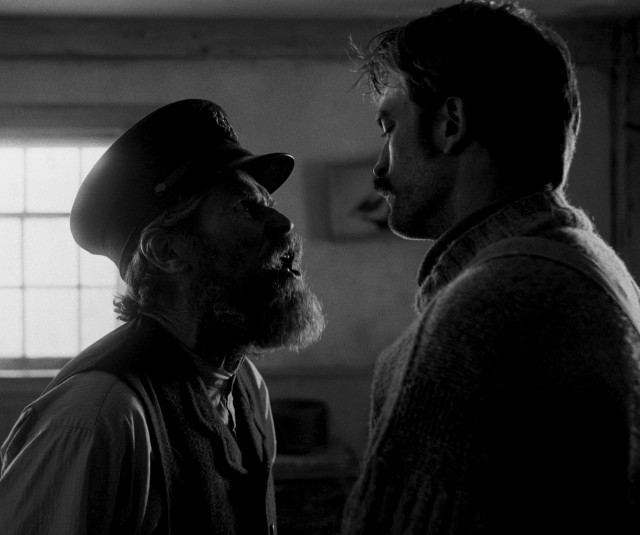The Lighthouse Movie Review
 |
The Lighthouse
Theatrical Release: October 18, 2019 / Running Time: 109 Minutes / Rating: R Writer/Director: Robert Eggers Cast: Robert Pattinson (Ephraim Winslow), Willem Dafoe (Thomas Wake), Valeriia Karaman (Mermaid) |
Writer-director Robert Eggers' first film, 2016's The Witch, commanded unusual respect for a wide release horror film. Critics loved the movie and many cineastes were crazy about it. Some of the latter even refer to the movie as The VVitch because that's closer to the title as it appears on the film and marketing, derived from Jacobean era withcraft pamphlets and other texts.
With its final grosses of $25 million domestic and $40 million worldwide, The Witch was not a huge force at the box office, but with a budget of just $4 million, it was plenty profitable. Besides, the film wasn't being judged against Paranormal Activity and Conjuring Universe movies. Eggers could have followed up his warmly-received debut with something more mainstream or taken the Aster route and made a second film comparable to his bold first. Instead, Eggers has done something much more impressive, doubling down on artistry and disregarding accessibility. Whereas The Witch employed the the long-unused 1.66:1 aspect ratio, The Lighthouse opts for the even less fashionable nearly-square 1.19:1 aspect ratio...and black and white.
The Lighthouse is nothing less than transportative and not simply because of those specifications. Where others view period films as an opportunity to trot out old fashions and maybe some bygone pop tunes, Eggers invests more fully and in settings way further back. The Witch was set in the 1630s and The Lighthouse is set in the 1890s. If done accurately and there is much reason to believe that Eggers can be credited at least with that, 1890s New England feels like an entirely different world than ours. Eggers mines the setting for thick atmosphere, again going all in on period vernacular.
Robert Pattinson and Willem Dafoe play a couple of lighthouse keepers who are to attend to their unnamed New England beacon for six weeks. Ephraim Winslow (Pattinson) is the newbie, having tired of the lumber industry. Thomas Wake (Dafoe) is the wily veteran. It is apparent from the start they're going to butt heads, as Ephraim refuses Wake's toast, citing his manual's rule prohibiting alcohol on the job.
Wake is long past the point of caring about the rules. He refuses the standard practice to alternate tower duties, entrusting only himself to man the lighthouse while Ephraim engages in all kinds of peripheral manual labor, which the demanding Wake is quick to criticize.
The two men begin to warm to each other just as their six weeks is up, drinking together and growing merry on the eve of the shift change. But amidst Nor'easter, their replacements never show. So, Ephraim and Wake stay on, having to ration their provisions while uncertainty lingers over their often strained time together.
The Lighthouse is a powerful, claustrophobic psychological thriller, one which wins you over with its premise and has your full attention for its nearly two-hour runtime. The film is an absolute feast visually and sonically, Technical strengths can only take you so far, but fortunately Eggers' rich screenplay sweeps you up with its precise, poignant, archaic dialogue and the fascinating machinations of its dynamic. Just two years ago, Dafoe gave the performance of a lifetime in A24's The Florida Project. He reaches new heights here, revealing the salty, flatulent, possibly deranged Wake to be the part he was born to play. Whether it's classfied as Lead or Supporting, Dafoe's performance absolutely ought to yield him a third consecutive Oscar nomination following Florida and last year's somewhat unexpected nod for his Van Gogh in At Eternity's Gate.
Pattinson has the unenviable task of trying to hold his own across from the mesmerizing Dafoe and he cannot, but the young Brit puts in a good effort as the more relatable and no less tormented protagonist. Pattinson seems to be taking career cues from his Harry Potter and the Goblet of Fire co-star Daniel Radcliffe, as he avoids forgotten heartthrob status by collaborating with bold, original filmmakers, like the Safdie brothers (Good Time), James Gray (The Lost City of Z), Claire Denis (High Life), and now Eggers. His average box office return may be taking a nosedive, but with the rebranded Box Office Mojo having recently removed the filmography feature, who will notice? Pattinson is placing his own tastes over those of the teenaged girls that comprised his original fanbase and the film community at least seems to respect and admire him for it. Besides, he still has the lead role in 2021's The Batman to bring him the bigger audience and nitpickier scrutiny that his arthouse works do not.
The Lighthouse arrives in theaters at precisely the moment that films competing for awards should. It does seem a little dark and artsy to lend to the red carpets and lavish parties that the season entails. Nonetheless, A24 is giving it a fighter's chance with its strategic rollout allowing demand to build along with some of the most buzz of the season in certain corners of the Internet. Last weekend, the film cracked the top ten at the box office despite a theater count of just 586. It's got a long way to go to even approach the modest numbers of Eggers' debut, but it should stick around long enough for cineastes to find and contribute to the conversation, whether or not the warranted recognition ever materializes.
|
Related Reviews:
DVDizzy.com | DVD and Blu-ray Reviews | New and Upcoming DVD & Blu-ray Schedule | Upcoming Cover Art | Search This Site
DVDizzy.com Top Stories:
Now in Theaters: Joker • Gemini Man • Motherless Brooklyn • Zombieland: Double Tap
Written and Directed by Robert Eggers: The Witch
Willem Dafoe: The Florida Project • Platoon • Spider-Man • The Last Temptation of Christ
Text copyright 2019 DVDizzy.com. Images copyright 2019 A24, Regency Enterprises, RT Features, and Parts & Labor Productions.
Unauthorized reproduction prohibited.

